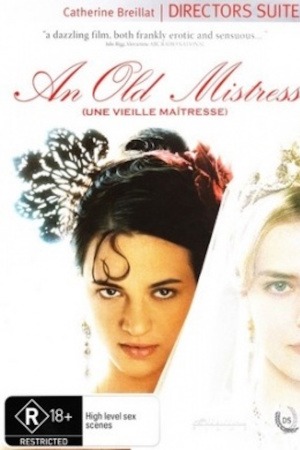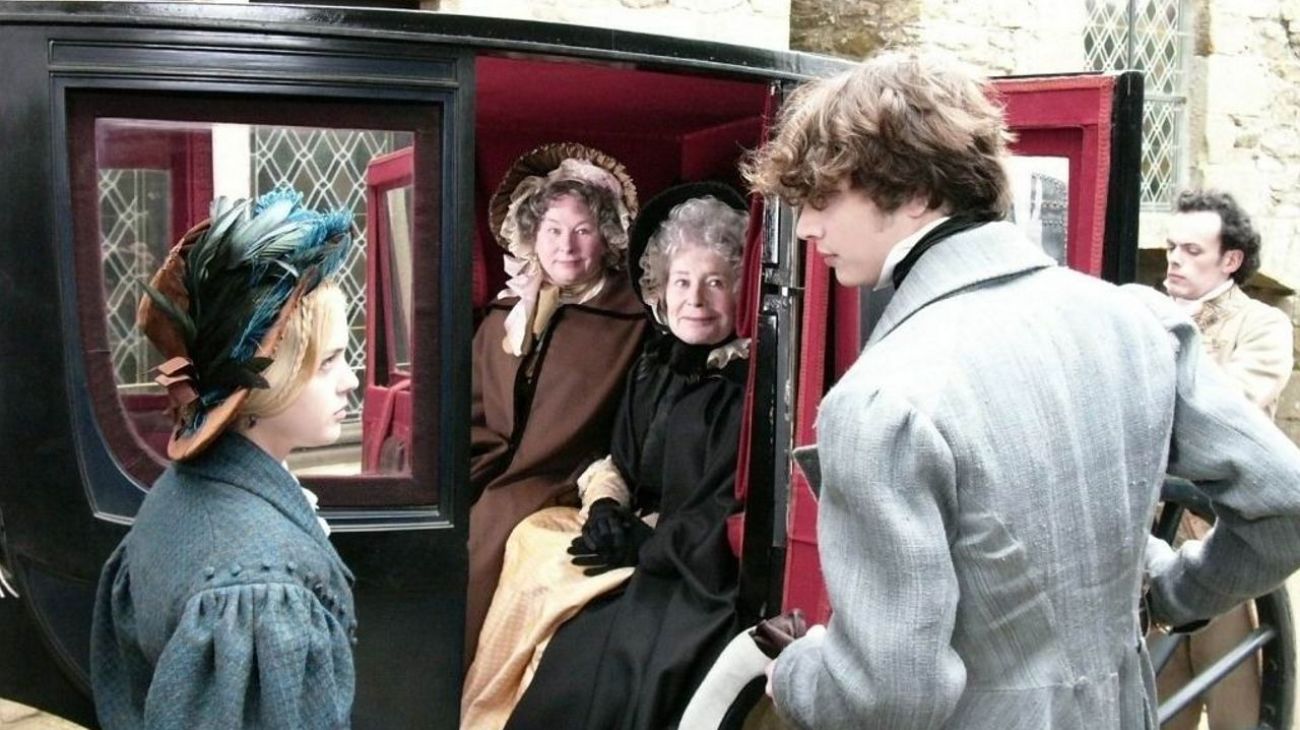
The 43rd Chicago International Film Festival
Ah, Asia Argento! I am not persuaded that she is a good actress, in the way that we customarily mean 'good," but she is an unnervingly perfect movie star: it is impossible to look at anything else when she is onscreen. She is electric in all things she does.
Lately, she's been doing costume dramas, oddly enough. Her last film seen in this country was Marie Antoinette, where she played Mme. du Barry and was the only flicker of life in Sofia Coppola's eye-candy parade. Now, we find her in The Last Mistress,* Catherine Breillat's adaptation of a most notorious 1851 novel by Jules-Amédée Barbey d'Aurevilly, and once again she is the lively center of a sometimes meandering tale of sexual intrigue.
The film opens with the proclamation that it takes place in 1835, the "century of Choderlos deLaclos," which is a little odd given that de Laclos died in 1803 and his work that so obviously inspired this story, Les liaisons dangereuses (newbie , was published in 1782. Except, as quickly becomes clear, Breillat is playing a tiny joke on us: it's the century of de Laclos because the people who live in it have been so fully consumed by that author's writings. At least the old generation has been, represented by the Comtesse d'Artelles (Yoland Moreau) the Vicomte de Prony (Michael Lonsdale) and the Marquise de Flers (Claude Sarraute), who view infidelity and sexual politics as a fine bit of fun gossip fodder and a game to play. The younger generation doesn't quite agree: the marquise's granddaughter Hermangarde (Roxane Mesquida), her fiancé Ryno de Marigny (Fu'ad Ait Aattou) and Ryno's former lover Vellini (Argento) are all a bit too ripped up inside to enjoy the consequence-free libertinism of their elders' youths.
I have never seen a film by Catherine Breillat - my impression is that they're unpleasantly nihilistic even by my generous standards of misanthropy - but I do know that two of her favorite topics are on display in this film: the inherent inability of the genders to mix peacefully, and hatefucking. Of course, I should be fair to Breillat and observe that hatefucking is a particular specialty of French art cinema in general. Never has an entire generation of artists so unanimously agreed that sex is something that can only occur between people who despise each other! And yet the sex scenes in The Last Mistress are still more flat-out erotic than anything in e.g. Lust, Caution, or anything in the American cinema (obviously).
Anyway, in this film, the hatefucking and the gender imbalance are very much the same impulse, which is that Vellini is a passionate woman who rebels against being put into a box and objectified by Ryno throughout their ten-year relationship, and who is aroused by her desire to do violence as much as by lust (the moment of the film, for me: after the young man is wounded in a duel with Vellini's husband, she licks blood out of his wound, in the semi-hope of infecting him and killing him).
This is at least the impression I get from the first half of the film, in which it seems obvious to me that Ryno is set up to be a licentious cad, discarding Vellini for Hermangarde's wealth. The second half of the film tends to directly contradict that impression, which I'm certain was supposed to be there. For one, Breillat has cast opposite the wild Argento a wan and pasty pretty-boy with large pouty lips and drowsy eyes, and he is in all possible ways a boring slat of nothing when contrasted to her vitality. For two, the director uses close-up shots to constantly put Ryno in the worst light: he seems leering and puffy. It's really wonderfully consistent how she uses close-ups, in fact, with the closest shots on any given character apparently reflecting how venal they are being in that instant.
The second half of the film muddles things a bit, both visually (it moves outdoors and becomes much less conspicuously framed) and thematically (suddenly Ryno is sympathetic). It's at this point that the marvelously entertaining old people cease to be in the picture very much and Argento becomes quite the only thing to keep our attention on the film at all, at least until the barnburner of a final montage. Still, as things to look at are concerned, she's dynamic, much more so than the suddenly trite film containing her. I will say this: I had always been told that Breillat liked to push buttons. Now that she's working with a budget literally as large as her entire preceding career put together, she has apparently learned conservatism and caution; for other than those sex scenes, nothing in the back half of the film feels edgy or political at all. Oh well. We'll always have Asia.
6/10
Lately, she's been doing costume dramas, oddly enough. Her last film seen in this country was Marie Antoinette, where she played Mme. du Barry and was the only flicker of life in Sofia Coppola's eye-candy parade. Now, we find her in The Last Mistress,* Catherine Breillat's adaptation of a most notorious 1851 novel by Jules-Amédée Barbey d'Aurevilly, and once again she is the lively center of a sometimes meandering tale of sexual intrigue.
The film opens with the proclamation that it takes place in 1835, the "century of Choderlos deLaclos," which is a little odd given that de Laclos died in 1803 and his work that so obviously inspired this story, Les liaisons dangereuses (newbie , was published in 1782. Except, as quickly becomes clear, Breillat is playing a tiny joke on us: it's the century of de Laclos because the people who live in it have been so fully consumed by that author's writings. At least the old generation has been, represented by the Comtesse d'Artelles (Yoland Moreau) the Vicomte de Prony (Michael Lonsdale) and the Marquise de Flers (Claude Sarraute), who view infidelity and sexual politics as a fine bit of fun gossip fodder and a game to play. The younger generation doesn't quite agree: the marquise's granddaughter Hermangarde (Roxane Mesquida), her fiancé Ryno de Marigny (Fu'ad Ait Aattou) and Ryno's former lover Vellini (Argento) are all a bit too ripped up inside to enjoy the consequence-free libertinism of their elders' youths.
I have never seen a film by Catherine Breillat - my impression is that they're unpleasantly nihilistic even by my generous standards of misanthropy - but I do know that two of her favorite topics are on display in this film: the inherent inability of the genders to mix peacefully, and hatefucking. Of course, I should be fair to Breillat and observe that hatefucking is a particular specialty of French art cinema in general. Never has an entire generation of artists so unanimously agreed that sex is something that can only occur between people who despise each other! And yet the sex scenes in The Last Mistress are still more flat-out erotic than anything in e.g. Lust, Caution, or anything in the American cinema (obviously).
Anyway, in this film, the hatefucking and the gender imbalance are very much the same impulse, which is that Vellini is a passionate woman who rebels against being put into a box and objectified by Ryno throughout their ten-year relationship, and who is aroused by her desire to do violence as much as by lust (the moment of the film, for me: after the young man is wounded in a duel with Vellini's husband, she licks blood out of his wound, in the semi-hope of infecting him and killing him).
This is at least the impression I get from the first half of the film, in which it seems obvious to me that Ryno is set up to be a licentious cad, discarding Vellini for Hermangarde's wealth. The second half of the film tends to directly contradict that impression, which I'm certain was supposed to be there. For one, Breillat has cast opposite the wild Argento a wan and pasty pretty-boy with large pouty lips and drowsy eyes, and he is in all possible ways a boring slat of nothing when contrasted to her vitality. For two, the director uses close-up shots to constantly put Ryno in the worst light: he seems leering and puffy. It's really wonderfully consistent how she uses close-ups, in fact, with the closest shots on any given character apparently reflecting how venal they are being in that instant.
The second half of the film muddles things a bit, both visually (it moves outdoors and becomes much less conspicuously framed) and thematically (suddenly Ryno is sympathetic). It's at this point that the marvelously entertaining old people cease to be in the picture very much and Argento becomes quite the only thing to keep our attention on the film at all, at least until the barnburner of a final montage. Still, as things to look at are concerned, she's dynamic, much more so than the suddenly trite film containing her. I will say this: I had always been told that Breillat liked to push buttons. Now that she's working with a budget literally as large as her entire preceding career put together, she has apparently learned conservatism and caution; for other than those sex scenes, nothing in the back half of the film feels edgy or political at all. Oh well. We'll always have Asia.
6/10
Categories: arty sex pictures, ciff, costume dramas, french cinema, trash and melodrama






